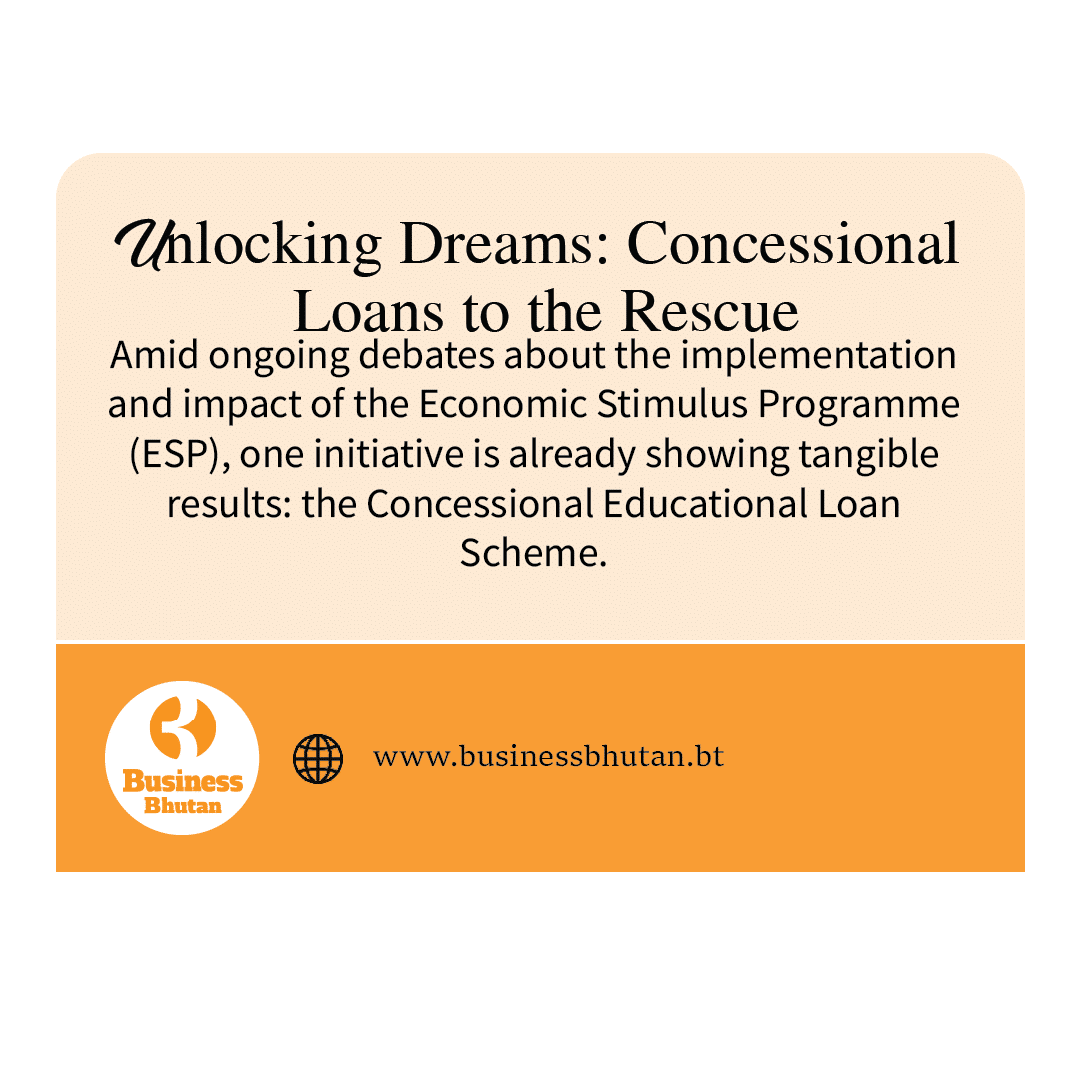Amid ongoing debates about the implementation and impact of the Economic Stimulus Programme (ESP), one initiative is already showing tangible results: the Concessional Educational Loan Scheme. Designed to make higher education more accessible to Bhutanese youth, this program is helping deserving students pursue their dreams while nurturing the nation’s future workforce. In its first semester alone, the Bank of Bhutan Limited (BoBL)—the sole implementer of the scheme—disbursed Nu 49 million in concessional loans, benefiting 476 students.
This has come as a silver lining for many families facing rising education costs and limited access to financial support. It has empowered students from economically disadvantaged, low-income households—those without business income or earning below Nu 50,000—to turn their educational aspirations into reality. Students like Yeshi Delker and Kinga Zangmo are living proof of its transformative impact.
Before the loan, higher education seemed like a distant dream for both Yeshi and Zangmo. Today, their smiles tell a different story. BoBL’s Concessional Educational Loan has opened doors that were once beyond reach.
For Yeshi, the loan has been life-changing. “Without this support, I could never have pursued my dream of becoming an engineer,” she shares. “My family simply could not afford the tuition fees. Now, I can look forward to a brighter future.”
Similarly, Zangmo, who completed her Class XII in 2022, once thought higher education was out of reach. Now serving as a Dessung volunteer in Jomotsangkha, she says, “I couldn’t enroll this year, but I plan to pursue my degree next year. This loan scheme has given me a second chance to follow my dream.”
Launched under the ESP, the Concessional Educational Loan Scheme provides financial assistance to Class XII graduates from economically disadvantaged backgrounds who wish to pursue tertiary education or vocational courses, both in Bhutan and India. The scheme offers loans of up to Nu 1.5 million per student to cover tuition and living expenses at a low annual interest rate of four percent. Unlike commercial loans, it requires no collateral and is not based on parental income, though a guarantor is necessary.
Through this initiative, Bhutanese youth are now stepping boldly toward their dreams—empowered, supported, and ready to shape the nation’s future.
Of the approved 476 applications, 273 students are pursuing their studies within the country, while 203 have enrolled in different institutions across India.
An official from the BoBL shared that most students have chosen to pursue studies in healthcare, with the scheme showing the highest enrollment in these fields.
A total of 226 applications were approved for the Diploma in General Nursing and Midwifery, followed by 57 for the Bachelor of Arts. The Bachelor of Science in Nursing also received 57 approvals, while 42 students were approved for the General Business Program.
Additionally, approvals included 25 students for the Bachelor of Science (BSc.), 17 for the Diploma in Construction Supervision, 14 for the Bachelor of Computer Applications, and 10 for the Bachelor of Engineering.
The BoBL official shared that 138 of the approved applicants are Gyalsups who have availed the loan under this scheme. Furthermore, the first-semester fees have been successfully reimbursed for applicants enrolled in July 2025 who had already made payments before their loan approval.
The repayment is structured to begin after the completion of the course and includes a generous grace period of one year, giving graduates additional time to secure employment before commencing payments. However, students must maintain satisfactory academic performance, as failure in any semester will result in ineligibility for further loan disbursements.
To avail the scheme, the student must be below the age of 25 years and should be a Bhutanese citizen. Moreover, students should be enrolled full-time. Recipients of the full scholarship, are not be eligible for the scheme.
Applicants have to apply between January and February for spring enrollment and June and July for fall enrollment.
The scheme will continue until June 2028 and will be implemented only by the BoBL. The BoBL will facilitate the loan process and disbursement, with monitoring mechanisms linked to academic performance and institutional verification.
The initiative’s detailed guidelines will also be implemented by a Joint Technical Working Group comprising representatives from Royal University of Bhutan, Ministry of Education and Skills Development, KhesarGyalpo University of Medical Sciences of Bhutan, private colleges and institutes, Department of Revenue and Customs, Department of Civil Registration and Census, BoBL, and ESP Secretariat.
Beyond its social impact, the scheme represents a strategic economic investment — channeling public funds toward building Bhutan’s human capital at a time when employment creation and skills development are national priorities. As policymakers continue to debate the broader efficiency of the ESP, the educational loan scheme stands out as a promising model of how targeted financial interventions can yield both social and economic dividends.
Meanwhile, the government has allocated a total budget of Nu 600 million under the ESP for this initiative, which will run until June 2028. With only Nu 49 million disbursed so far, the scheme is expected to support thousands more in the coming years.
Nidup Lhamo
From Thimphu















